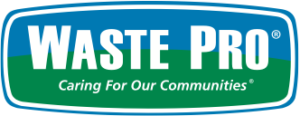 How many times have you thought about what happens to your garbage and recycling, whether at home or at your business? Probably not too often, which for us is a good thing. That means we’re doing our job at Waste Pro well. But it also means that not many people know very much about the waste management process, and sometimes that can lead to confusion and frustration. That’s the last thing we want our customers – the residents and business owners in the Big Bend area – to experience.
How many times have you thought about what happens to your garbage and recycling, whether at home or at your business? Probably not too often, which for us is a good thing. That means we’re doing our job at Waste Pro well. But it also means that not many people know very much about the waste management process, and sometimes that can lead to confusion and frustration. That’s the last thing we want our customers – the residents and business owners in the Big Bend area – to experience.
One of the best things our customers can do to help us keep this community clean and safe is to learn about what kinds of things can be thrown out with the everyday garbage, and what might need to be picked up separately or taken to the city or county service facilities. Things like paints and stains, tires, fluorescent lights and other electronic waste are good examples of items that are household hazardous waste. These items cannot be thrown in your garbage can or set out by the curb because they could pose a threat to human health and/or the environment. Other bulky items like furniture or bikes may be picked up separately from your regular garbage pickup, but depending on where you live, you may have to request a separate pickup.
Recycling is something our community definitely cares about, and Waste Pro is proud of the role we play in helping our customers care for our environment. However, we know our community has lots of questions when it comes to recycling — specifically, what happens to our recyclables and how can we do a better job overall when it comes to recycling. One of the biggest challenges with recycling is reducing contamination, such as food remnants or materials that can’t be recycled getting included. It’s really helpful to the recycling process when residents rinse off their recyclables before putting them in the bin, and when residents check to make sure they really can recycle something before setting it out. Styrofoam, wires, plastic bags and medical syringes are all examples of things that are definitely non-recyclable. More information is online here.
If you’re a business owner, you may have a Waste Pro container or dumpster at your business location that gets picked up once or twice a week, depending on the type of waste your business throws out. Commercial customers with food waste are among those who receive twice weekly service. This type of waste is called “putrescible,” which means it is likely to begin decaying or putrefying if left for too long.
If all of this sounds a little gross, you’re not wrong. Waste management is a messy, smelly and difficult job. However, think of what our community would be like if no one was there to handle the mess, including clean up jobs after festivals, parades, sporting events and other activities with lots of people… and garbage. Our community certainly wouldn’t be as welcoming and lovely as it is today, and we’re proud of the role we get to play in helping maintain that reputation. Our drivers and helpers are proud of this too, and would love to get to know their customers a little better. If you see a Waste Pro truck in your neighborhood or on the street in front of you, slow down, give them a wave, and maybe say hello if it’s safe to do so. We’re always happy to help make waste management a little easier to understand.

